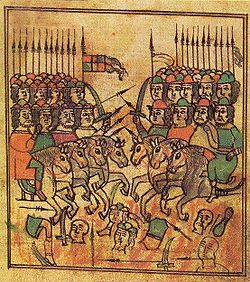Battle of Kulikovo
| Battle of Kulikovo | |||||||
|---|---|---|---|---|---|---|---|
| Part of Mongol Yoke | |||||||
 17th century illustration |
|||||||
|
|||||||
| Belligerents | |||||||
|
Russian principalities: |
|
||||||
| Commanders and leaders | |||||||
| Dmitri Ivanovich Donskoy of Moscow |
|
||||||
| Strength | |||||||
| from 30,000 to 50,000-60,000 | from 30,000 to 100,000 – 150,000 | ||||||
| Casualties and losses | |||||||
| Unknown | 8/9 of the army | ||||||
Russian principalities:
Moscow
Tver
Suzdal—Nizhny Novgorod
Smolensk
Rostov
Yaroslavl
Murom![]() Polotsk
Polotsk
The Battle of Kulikovo (Russian: Мамаево побоище, Донское побоище, Куликовская битва, битва на Куликовом поле) was fought between the armies of the Golden Horde under the command of Mamai, and various Russian principalities under the united command of Prince Dmitri of Moscow. The battle took place on 8 September 1380, at the Kulikovo Field near the Don River (now Tula Oblast, Russia) and was won by Dmitri, who became known as Donskoy (of the Don) after the battle.
Although the victory did not end the Mongol domination over Russia, it is widely regarded by Russian historians as the turning point when Mongol influence began to wane and Muscovite power to rise. This process eventually led to Muscovite independence and formation of the modern Russian state. According to the Russian historian Lev Gumilev, "Russians went to the Kulikovo field as citizens of various principalities and returned as a united Russian nation".
...
Wikipedia
